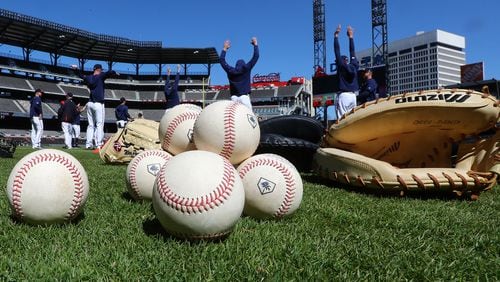This year’s was an unconventional MLB draft. It was strange. It was not ideal. It was nothing like drafts of the past, from format to execution. It was exemplary of baseball’s new norm.
MLB trimmed its draft from 40 rounds to five. To put it mildly, that is an astronomical difference. It was a terrible look for a professional sports league that’s supposed to care about its players and fans. It essentially encouraged young athletes to pursue other sports instead (Kyler Murray, as it turns out, made a sound decision).
The truncated draft did, however, save the owners some money.
Cutting the draft should’ve been a huge story. Yet, it didn’t seem to make headlines outside the baseball community. It isn’t an exact comparison, but what if the NFL shortened its draft from seven rounds to two because of financial reasons? What if the NBA did only lottery picks (14) and every other prospect entered free agency? Those would be the biggest sports stories of the year.
As a millennial who very much enjoys baseball, I can tell you we’re a lessening breed. The lack of concern on the national scale speaks to baseball’s fading relevancy. It should be alarming to the baseball world that making such a significant change didn’t cause a ripple outside its own bubble.
The MLB draft has always been drastically less popular than the NFL and NBA editions. Most of us watched Joe Burrow burn through the SEC, win the Heisman Trophy and crush Clemson in the title game. A season before that, we watched Zion Williamson’s dunks, his shoe explosion and Duke’s run to the Elite Eight.
Seeing Arizona State slugger Spencer Torkelson go No. 1 just isn’t as exciting TV. That’s no disrespect to Torkelson, who should be a phenomenal player. It’s just another example of a compelling subplot that baseball lacks.
Still, you'd think this draft would've had more buildup considering the lack of live sports. Then you have the disturbing element of cutting it by 35 rounds. At least viewership was up after dipping last year. Day 1 reportedly had an average of 615,000 viewers across MLB Network, ESPN and ESPN Deportes.
Note that’s with the draft broadcast on ESPN for the first time since 2008 (the Worldwide Leader has trimmed its baseball coverage in recent years, which is a shame because “Baseball Tonight” is missed as a more regular presence). That’s with it being a drink of water for the dry-mouthed inhabitants of a currently baseball-less desert. But it’s a ratings increase nonetheless. A minor win, I suppose, at a time the sport could use even the smallest bit of good news.
Speaking of good news, MLB and Turner Sports are reportedly near an extension worth roughly $470 million annually. With that deal set to kick in after 2021, Forbes estimated that MLB could bring in $2 billion annually from national TV contracts.
An obvious observation: MLB is profitable, despite some suggesting the contrary. A not-so-obvious observation: MLB still isn’t dying. The money is still pouring in. But the aging audience and dragged-out games, among other disenchantments, aren’t easy fixes. They’re just a couple of factors to consider when evaluating the sport’s long-term future, which isn’t looking bright despite the dollar signs.
The lack of excitement, intrigue and grand-scale coverage around baseball right now speaks to MLB’s growing irrelevancy to the national, and especially younger, audience. As we’ve seen throughout the league’s and union’s negotiations, baseball is lagging behind. I’m not going to pretend to have all the answers, but it’s fair to say the MLB brain trust doesn’t inspire any confidence that the sport will overcome the hole it’s in. For too long, it’s seemed the sport can’t identify its own problems.
Truth is, baseball is trending toward becoming more a niche following than a sport that will attract the all-important casuals.
I don’t say this to be negative – I say it out of love – but baseball has major issues; problems that won’t be fixed by a pitch clock, signaling for an intentional walk or even Mike Trout doing more commercials. The past several weeks have served as a reminder of why this sport is struggling to entice new fans while simultaneously pushing away even its most passionate base.
The 1994 strike alienated fans, many of whom never came back – or if they did, didn’t carry the same enthusiasm. The pharmacological theater of ’98 injected life back into baseball. Whatever you think of Mark McGwire, Sammy Sosa and the like, they played integral roles in bringing MLB to its modern peak popularity (sidebar: Ken Griffey Jr. and Chipper Jones deserve a salute here, as always).
Fast forward two decades. Baseball misses the pizzazz of the steroids era. For as much as it was illegitimate – I would not vote any of them into the Hall of Fame as of now, though I don’t have a vote – it was exciting. It was box office. Must-see TV.
MLB still has the eye-popping talent, just as it did then. We see one of its greatest young ambassadors, Ronald Acuna, right in our own town. We had a 21-year-old on the doorsteps of a clean 40-40 season. Yet the individuals and game itself isn’t resonating the same with the masses.
Baseball is making alterations to the on-field product. Next time they play, we’ll see a three-batter minimum rule for pitchers. Soon, we’ll likely see the designated hitter in the National League on a permanent basis. Playoff expansion feels inevitable, though I don’t know when “inevitable” will be.
The only change officially implemented – the three-batter minimum – was set to begin March 12, in the thick of spring training. Naturally, that was the day MLB was forced to cease operations because of the pandemic. So we’ve yet to actually see how that will play out.
Proposed changes have garnered split reviews, but those conversations have been overshadowed by continued public-relations nightmares for the sport. Remember the central storyline when teams began camp in February? It feels like forever ago that baseball was shrouded in the Astros scandal; bad press that now looks like child’s play compared with the last month.
The ongoing negotiation leaks have only further angered spectators. It’s exhausting to follow. You see the phrase plenty on social media: “I don’t care anymore if there’s a season.” Many fans’ feelings have gone from mad to disappointed to the worst stage: apathetic. That is how you alienate consumers.
Then there’s the optics of arguing money, whatever the amount, while the nation is overwhelmed with far more important factors – the pandemic, millions unemployed and social injustice. I understand why the MLB and MLBPA are struggling to find middle ground – fighting for every dollar is their right – but the situation surely isn’t winning the sport any good graces either. MLB already missed its chance at a PR win when it fumbled away a July 4 opening day during the unproductive proposal swapping.
I don’t know what will become of the 2020 season. The likeliest outcome is commissioner Rob Manfred imposing a 48-to-54 game season, and while the legitimacy would be questioned and that decision would further poison the well with players, MLB will hope the on-field events overshadow those realities in the immediate future.
That’s a short-term “solution” that likely will cause long-term damage, specifically when the collective bargaining agreement expires in 2021. Blame is placed at the owners’ feet on this one.
As a millennial who grew up loving this sport, it’s disappointing to see its decline. Fewer and fewer people in my age group care about baseball. More and more people in my age group can identify the Lakers’ Alex Caruso or the Heat’s Kendrick Nunn while not knowing who Matt Chapman, a top-three third baseman, even is.
This debacle, with a potential lockout looming, will only continue to shove MLB out of the positive spotlight. Unfortunately, there’s no reason to believe it will reverse that trend anytime soon. This time, there won’t be a steroids era to bail it out.
About the Author







